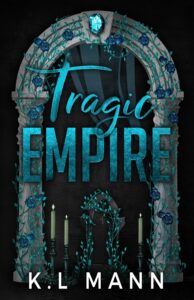The framed photo of our daughter at twenty weeks’ gestation, captured in stunning detail by the latest ultrasound technology during the anatomy scan, sits in a place of honor on my desk, centered between my laptop and the secure phone I use for business calls. I can see her profile clearly now, including the curve of her nose, the shape of her lips, and tiny fingers that will someday hold mine.
The appointment three days ago was unlike anything I’d experienced. Watching her move and stretch on the monitor, seeing her heart beating strong and steady, and knowing she’s healthy and growing exactly as she should all changed something for me. It made the abstract concept of fatherhood into something immediate and urgent.
I pick up Elizabeth’s photo now, studying the image that’s already burned into my memory. Dr. Price printed several copies, but this one captured the perfect moment when our daughter turned toward the camera, almost like she was looking directly at us.
“She’s going to be beautiful,” Sabrina had whispered in the darkened exam room, tears streaming down her face as we watched our child move on the screen.
Beautiful and innocent and completely unaware that her father has spent years building an empire on violence and fear. The thought makes my chest tighten with something that feels like shame and desperate determination.
I set the photo back in its place and turn my attention to the documents spread across my desk. There are financial reports, asset valuations, and succession plans I’ve been working on for weeks. The quiet process of dismantling everything I’ve built over the past fifteen years is delicate work.
I can’t simply walk away without ensuring the transition won’t create a power vacuum that invites war. Too many people depend on the stability I’ve provided, and too many enemies would see my withdrawal as an opportunity to seize territory and resources.
A knock at my study door interrupts my planning. Maksim enters without waiting for permission, carrying a thick folder and wearing the expression he gets when he’s been working on complex problems.
“The latest reports you requested,” he says, dropping the folder on my desk.
I flip it open and scan the first page of the detailed financial projections for transitioning our legitimate businesses away from any connection to illegal operations. The numbers are sobering but manageable as I look at the facts distilled down to numbers and details, including three construction companies, two import/export businesses, the medical clinics, and a dozen smaller ventures that generate clean revenue. “Talk me through the timeline,” I say, studying the charts and projections.
“The construction companies are the easiest. They’re already operating independently with minimal oversight from us. We can sell them outright to the current management teams within sixty days. A lot of money is laundered through them, but that could be curbed and gradually transition to fully legitimate businesses within…eighteen months, after wrapping up current contracts with…certain associates.”
I nod, making notes in the margins. “What about the import business?”
“More complicated. There are existing contracts and relationships that will take time to unwind, and a lot of smuggling happens through these. I recommend transferring ownership to a holding company based in the Cayman Islands, then gradually selling shares to legitimate investors over the next year as we focus on cleaning up the source of the goods moving through them.”
I nod in agreement. “And the medical facilities?”
“Those stay exactly as they are. They generate clean revenue from essential services, and they give you a legitimate reason to maintain certain connections in the business community.” Maksim pulls out a separate document. “I’ve identified twelve facilities we can expand into full-service clinics. The profit margins are excellent, and the business model is completely above board.”
I review the expansion plans, impressed by the thoroughness of his research. “What’s the total investment required?”
“Forty-two million for the medical expansion. Another fifteen to transition the construction companies, or an estimated forty million in profit if you just sell them to others looking for that type of investment without any change. The import restructuring will cost about eight million in fees and taxes.”
“Acceptable. I want at least two free clinics though, where people can go without insurance, or if they have bad insurance.” My thoughts are squarely on Sabrina and her mother as I say that.
Maksim looks surprised. “That will eat into profits—”
“I don’t care. Make it happen.” At his nod, I close that section and move to the next page. “What about territory management?”
“I’ve been in preliminary discussions with Anton Volkov and Dmitri Kozlov. Both are interested in taking over different sectors of our illegal operations, and both have the infrastructure to maintain stability without involving us directly.”
I know both men well enough to trust their capabilities. “Terms?”
“Volkov wants the waterfront territory and shipping operations. He’s offering twelve million plus ongoing tribute payments to key people who might otherwise cause problems during the transition.”
I nod since it’s a generous offer. “And Kozlov?”
“He wants the gambling and entertainment businesses. Twenty-eight million upfront, plus he agrees to honor all existing protection agreements for two years.”
The numbers are lower than what those operations generate annually, but the clean break is worth the financial loss. “What about enforcement and collections?”
“That’s where it gets complicated.” Maksim shifts in his chair. “Those operations can’t be transferred cleanly. They’re too tied to personal relationships and reputation. We’ll have to wind them down gradually.”
“How gradually?”
“Six months minimum. We honor existing contracts but don’t take on new business. Existing debts get collected or forgiven on a case-by-case basis. Anyone who wants to continue in that line of work gets transferred to Volkov or Kozlov’s organizations with our recommendation.”
I consider the implications. “And if someone doesn’t want to transfer?”
“Generous severance packages and new identities if they want them. We take care of our people, Nikandr. That doesn’t change.”
“Good.” I flip to the next section, which details offshore banking and asset protection. “Tell me about the financial restructuring.”
“I’ve identified thirty-seven million in liquid assets that can be moved to legitimate accounts in Switzerland and Singapore within thirty days. Another sixty million in investments that will take longer to liquidate without attracting attention.”
“Timeframe for full liquidation?”
“Eighteen months for everything, but I recommend keeping about twenty million in easily accessible accounts as insurance money in case the transition doesn’t go as smoothly as we hope.”
The suggestion makes practical sense, even though the idea of needing insurance money makes my stomach tighten. “What kind of problems are you anticipating?”
He arches a brow. “Vadim is the obvious concern, but there could be others who see your withdrawal as an opportunity to settle old scores or grab territory. Having liquid assets available gives us options if we need to solve problems quickly.”
I study the financial projections, noting the careful way Maksim has structured everything to minimize tax implications and regulatory scrutiny. “What about ongoing expenses? Security, staff, and maintenance of legitimate businesses?”
“The medical facilities generate enough revenue to cover all necessary. The construction company sales will provide a substantial cash cushion if you go that route, and the territory transfers include ongoing consultation fees that will supplement income during the transition period.”
“Consultation fees?”
“Both Volkov and Kozlov want to maintain access to your expertise during their first year of operations. Nothing that compromises your exit strategy, but enough involvement to ensure a smooth transition and continued loyalty from people who might otherwise cause problems.”
The arrangement makes sense from a strategic standpoint, though the idea of maintaining any connection to those operations makes me uncomfortable. “Define ‘consultation.’”
“Monthly meetings to discuss territorial disputes, advice on major decisions, and recommendations for key personnel. There will be no direct involvement in day-to-day operations, and no participation in anything illegal. You become an elder statesman offering guidance, not an active participant.”
I nod slowly, mulling it over. “For how long?”
He gives me a terse smile. “One year maximum. After that, you’re completely out.”
I close the folder and lean back in my chair, processing the magnitude of what we’re discussing. It’s hard to believe fifteen years of careful planning and strategic expansion can be dismantled, transitioned, or redistributed in less than two years.
“There’s one more thing,” he says. “Personal security during and after the transition. You’ll need protection for your family that doesn’t depend on active Bratva connections.”
“What do you recommend?”
“A private security firm. Legitimate, licensed, with no connections to organized crime. I know a company in London that specializes in protecting high-net-worth individuals who’ve received credible threats. They’re discreet, effective, and expensive. It might be worth buying into such a company as well.”
“Cost just for protection if I don’t choose to invest?”
He looks down briefly at his tablet. “Two million annually for comprehensive protection. Less if you’re willing to accept reduced coverage after the first year.”
The expense is manageable, and the peace of mind would be invaluable. “Set up a meeting.”
“I’ve scheduled one for next week. They’ll conduct a full security assessment of any properties you plan to use, recommend personnel, and develop protocols for your family’s protection.”
I nod, making notes about timing and logistics. “What else?”
Once more, he consults his tablet. “Legal documentation. We need to ensure everything we’re doing is properly structured to avoid future complications. I recommend bringing in a specialist who handles high-level asset protection and international business law.”
“Someone clean?”
He nods. “Completely. No connections to anything questionable. I know a firm in New York that handles this kind of work for Fortune 500 executives and foreign nationals. They’ll ask minimal questions and provide maximum protection.”
The thoroughness of Maksim’s planning impresses me, though it also highlights just how complex this process will be. “What’s the timeline for legal documentation?”
He seems to be calculating before he answers. “Sixty days to set up the basic structure, plus another six months to complete all transfers and establish full legal protection for your assets and family.”
I study the folder again, noting the careful attention to detail in every projection and recommendation. “You’ve put a lot of work into this.”
He shrugs. “I want to make sure you can actually walk away when the time comes with no loose ends, no unfinished business, and no reasons for anyone to come looking for you.”
The simple statement encapsulates years of loyalty and friendship. Maksim isn’t just helping me plan an exit strategy. He’s ensuring that I can build the life I want for my family without constantly looking over my shoulder. He and I both know I have to deal with Vadim before I can fully escape though.
He shifts in his chair. “What about Sabrina? Are you planning to tell her about this?”
The question hits a nerve, and I wince slightly. “Not yet. I want the groundwork laid and the path secured before I make promises I might not be able to keep.”
He nods like he approves of that strategy. “She’s going to figure it out eventually. The woman isn’t stupid.”
“I know, but I also know she’s still nervous. She glances over her shoulder sometimes like she’s expecting threats to materialize out of thin air.” The observation comes out rougher than I intended. “I never want her to feel that way again, especially when our daughter arrives.”
“So, you’re going to keep her in the dark while you dismantle your entire life?” He sounds skeptical.
I frown at him. “No. I’m going to protect her from worry she doesn’t need to carry.” I close the financial reports and stack them neatly. “She’s finally starting to relax and starting to believe we might have a future together. I won’t jeopardize that by burdening her with details about exit strategies and succession planning.”
Maksim studies my face carefully. “You love her.”
The statement isn’t quite a question but demands an answer, nonetheless. I could deflect or point out that love is a luxury I can’t afford in my position but sitting here with my daughter’s ultrasound photo watching over us, the lie won’t come. “Yes.”
“Does she know?”
“I haven’t told her.” The admission feels like confessing weakness. “I’m not sure she’s ready to hear it, and I’m not sure I’m ready to say it.”
He seems like he might smile for a moment. “But you’re willing to give up everything for her.”
I give him a repressive look. “I’m willing to give up everything for them and the family we’re building together.” I pick up the ultrasound photo again, tracing the outline of our daughter’s profile with my finger. “Love isn’t just about words, Maksim. It’s about choices, and I choose them over everything else.”
“For what it’s worth, I think you’re doing the right thing.”
I smile briefly. “That’s worth a lot more than you might believe, Maksim.”
That night, after dinner and a movie that Sabrina picked—some romantic comedy that would normally make me reach for my phone—I actually pay attention to the story. Not because the plot is particularly compelling, but because watching Sabrina react to it is fascinating.
She laughs at the funny parts, rolls her eyes at the ridiculous romantic gestures, and tears up during the emotional scenes in a way that makes my chest ache with tenderness. Somewhere during the second act, she curls up against my side, her head finding the spot between my shoulder and chest that seems designed for her.
“This is nice,” she whispers sleepily, resting her hand on the curve of her belly.
“What is?”
“This. Being normal. Watching terrible movies and eating too much popcorn and not thinking about anything complicated.”
I press a kiss to the top of her head, breathing in the scent of her shampoo. “You deserve normal.”
“We deserve normal,” she corrects, and the way she includes me in that statement does something to my chest I don’t want to examine too closely. By the time the credits roll, she’s asleep against me, breathing deeply in a way that tells me she feels safe. I should wake her to suggest we move to the bedroom, where she’ll be more comfortable.
Instead, I reach for my phone and send a carefully worded text to Maksim that commits to the plan we’ve designed: Start liquidating non-essential assets. Move offshore accounts to secure locations. Timeline is 6 months max.
His response comes within minutes: Understood. Will have preliminary plans ready by tomorrow.
I set aside the phone and settle back into the couch, careful not to disturb Sabrina’s peaceful sleep. Tomorrow I’ll begin the process of systematically destroying everything I’ve spent years building. I’ll make enemies of former allies and burn bridges that can never be rebuilt.
Tonight, holding the woman I love, and the child we created together, I can’t bring myself to regret any of it. Some things are worth burning the world down for, and my family is at the top of that very short list.
These will be my final months in the Bratva. Once Vadim is eliminated and the immediate threats are neutralized, I want nothing left of this life to return to—no territory to reclaim, no operations to restart, and no reason for anyone to come looking for the man I used to be.
I’ll become someone new, who’s worthy of the family I’m determined to protect, and can teach his daughter about honor and loyalty without having to explain why those lessons came written in blood.
The transformation won’t be easy, and it won’t be without cost, but as I watch Sabrina sleep, one hand unconsciously protective over our child, it’s the only choice with which I can live.
My daughter will never know the sound of gunfire. She’ll never see her father’s hands stained with blood. She’ll grow up believing the world is fundamentally good because I’ll make sure the darkness never touches her. That’s a promise I intend to keep, no matter what it costs me.














